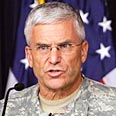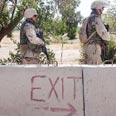

WASHINGTON- General George Casey, the United States' Army's senior commander in Iraq, will most likely be forced to pay the price of President George Bush's strategic failures in the war in Iraq.
The New York Times reported that President Bush plans to fire the general, who was supposed to complete his service this coming summer, within the next few weeks.
The report said that Bush did not like his commanders' strategy, which aimed for retreat without victory, and Bush is taking advantage of the replacement of Secretary of Defense Rumsfeld with Robert Gates in order to get rid of Rumsfeld's senior general in Iraq as well.
Bush is expected to announce the new strategy he wishes to outline for the war in Iraq. These past few days, Bush has been convening with his advisors, and will reveal his plans at the end of these meetings.
Temporary reinforcement
The issue of the temporary reinforcement of the troops in Iraq hovers in the background. This suggestion, which appears to contradict the principal ambition of minimizing the number of American soldiers in Iraq, is meant to achieve stability of the security situation before doing so.
Bush recently launched an experiment on the media regarding his intention to increase the number of American troops in Iraq, at least temporarily, from 140,000 to 170,000 troops.
The US's National Security Advisor Stephen Hadley recently admitted that the Iraqi forces are unable to control areas that the US Army had already cleared out. The reinforcement is therefore meant to allow the American Army to occupy areas and then keep them.
General Casey has lead a contradicting process of handing over authority to the Iraqi army, and a gradual withdrawal of American forces – a move that had failed because of the Iraqi commander's inability to take charge, and the serious deterioration in internal security.
Despite the failure, which was measured with record numbers of dead citizens and American soldiers in Iraq, Casey continues to oppose the temporary reinforcement.
In an interview to the New York Times, Casey warned against a lengthy expansion saying: “The longer we in the US forces continue to bear the main burden of Iraq’s security, it lengthens the time that the government of Iraq has to take the hard decisions about reconciliation and dealing with the militias.”
“And the other thing is that they can continue to blame us for all of Iraq’s problems, which are at base their problems,” he continued.
Bush wants victory
Still, Bush is sticking to his guns. From the background talks he held with his generals, it became clear to then that Bush is not interested in hearing about steps that would stabilize the situation, or a dignified American retreat from Iraq. He is unwilling to hear anything short of an American victory in Iraq.
Washington analysts claimed that President Bush is in double denial, first, on the real situation in Iraq, and then on his own political situation and his limited ability to advance political processes in a congress that will soon be in the hands of democratic control.
Senator Joseph Biden, chairman of the Senate's Foreign Relations Committee, plans to appoint a line of hearings on the Iraq matter, and summon officials such as Secretary of State Condoleezza Rice.
Analysts believe that the new Congress under democratic control will make allocating funds for the war in Iraq more difficult.















